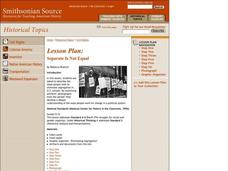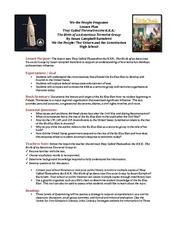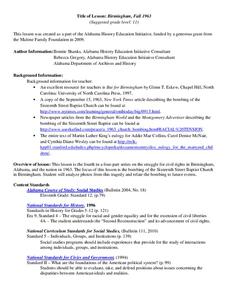Curated OER
Separate Is Not Equal
Based on discussion, analysis of primary source documents, and with the help of a graphic organizer, young historians discover the steps that were taken to eliminate segregation in public schools in the United States. This lesson from...
National Endowment for the Humanities
Slavery and the American Founding: The "Inconsistency Not to Be Excused"
High schoolers examine slavery in the revolutionary and colonial eras of the United States. In this slavery lesson, students investigate the presence of slavery in early America, the language of the Constitution, and the intent of the...
Alabama Department of Archives and History
Booker T. Washington and W.E.B. DuBois
Where to begin? With the vocational education that provides the skills necessary to gain economic security or with a Liberal Arts education? As part of a study of leaders of the civil rights movement, class members compare and contrast...
Facing History and Ourselves
The Legacies of Reconstruction
The final lesson in the seven-resource Reconstruction Era collection examines the legacies of Reconstruction. Class members investigate why the period has been called an "unfinished revolution," "a splendid failure," and "the second...
US House of Representatives
“‘The Negroes’ Temporary Farewell,” Jim Crow and the Exclusion of African Americans from Congress, 1887–1929
Despite some advances made during the Reconstruction Era following the Civil War, the period from 1887 through 1929, African Americans serving in Congress suffered severe setbacks due to Jim Crow Laws and voter suppression. Class members...
Curated OER
The Called Themselves the K.K.K.; The Birth of an American Terrorist Group
How did Ku Klux Klan develop and flourish in the US? How did the government respond to acts of terrorism conducted by the KKK following the Civil War? How does the government respond to acts of terrorism today? This resource launches a...
Alabama Department of Archives and History
African American Life After the Civil War - Sharecropping
What is the sharecropping system? What role did it play in the post-Civil War economy of the South? Who were the sharecroppers? Who employed them? How were they paid? To answer these questions, kids examine a series of sharecropper...
John F. Kennedy Presidential Library & Museum
Analyzing the Inaugural Address
Get high school historians to step outside their own shoes by responding to JFK's inaugural address from the perspective of a civil rights activist, a soviet diplomat, or a Cuban exile. After a class discussion about the address, the...
Alabama Department of Archives and History
Strange Fruit: Lynching in America
To continue their study of the Civil War, Reconstruction, and the beginning of the civil rights movement, class members watch the YouTube video of Billie Holiday singing "Strange Fruit" as an introduction to an examination of lynching in...
City University of New York
African Americans and the Populist Movement
Why did the Populist Party fail to ally itself with African American farmers? To answer this essential question, class members investigate the Populist Era (188-1900) and read an article written by Tom Watson, a Populist leader.
Bill of Rights Institute
Freedom for All?
What did abolitionists have in common with those working for women's rights? How has the Native American struggle for voting rights differed from the struggles of other groups? Class members examine the 15th, 19th, 23rd, 24th, and 26th...
Center for Instruction, Technology, & Innovation
Did African American Lives Improve After Slavery?
The Civil War made slavery illegal, but all ex-slaves were not totally free. Scholars visit eight different classroom stations to uncover life during the Reconstruction Era in America. Groups discover items such as Black Codes, 13th,...
Center for History and New Media
A Look at Virginians During Reconstruction, 1865-1877
The transition between rebellion to reunification was not smooth after the Civil War. Young historians compare primary and secondary source documents in a study of the Reconstruction era in Virginia, noting the rights that were not...
Facing History and Ourselves
A Contested History
Memories of and interpretations of history change—that's the key takeaway from a instructional activity that has young historians compare the story of the Reconstruction Era as told by the historians of the Dunning School to the view of...
US House of Representatives
A Picture is Worth a Thousand Words
Groups select a photograph from one of the four eras of African Americans in Congress and develop a five-minute presentation that provides background information about the image as well as its historical significance. The class compares...
US House of Representatives
Keeping the Faith: African Americans Return to Congress, 1929–1970
The third instructional activity in a unit that traces the history of African Americans serving in the US Congress examines the period from 1929 through 1970. After reading a contextual essay that details the few African Americans...
Center for History Education
African Americans and the Democratic Party
Why did African American voters switch from the Republican Party to the Democratic party during the Depression Era? That is the question young historians attempt to answer as they study primary source documents from the period. The focus...
Facing History and Ourselves
The Political Struggle, 1865-1866
Healing versus justice. The central source of tension following the United States Civil War was between the demands for healing and the demands for justice, the battle between President Andrew Johnson and Congress. A video introduces the...
US House of Representatives
Permanent Interests: The Expansion, Organization, and Rising Influence of African Americans in Congress, 1971–2007
The fourth installment of the seven-lesson unit focused on African Americans elected to and serving in the US Congress looks at the period from 1971 through 2007. Class members read a contextual essay that provides background information...
US House of Representatives
“The Fifteenth Amendment in Flesh and Blood,” The Symbolic Generation of Black Americans in Congress, 1870–1887
The reading of a contextual essay launches a study of Black Americans who served in Congress from 1870 through 1887. Young historians identify the African Americans who served during this period, investigate the ways they won national...
PBS
Amid Rising Economic Inequality, Does America Need a Third Reconstruction?
Young political scientists investigate the Poor People's Campaign protest held in Washington, D.C., on June 18, 2022. They research how the event was reported in various news outlets and consider their stance on whether "poverty is...
Alabama Department of Archives and History
Birmingham, Fall 1963
Can any good come from acts of evil? The 1963 bombing of the Sixteenth Street Baptist Church in Birmingham, Alabama, and the eventual outcomes of the tragedy, are the focus of a lesson that asks groups to examine primary source documents...
Center for History and New Media
Growing Up in a Segregated Society, 1880s–1930s
What did segregation look like in the beginning of the 20th century? Middle and high schoolers view images of segregated areas, read passages by Booker T. Washington and W.E.B. DuBois, and come to conclusions about how the influence of...
Library of Virginia
Antebellum Freedom
From indentured servitude to involuntary race-based servitude, slavery has taken many forms in American history. Class members examine three manumission petitions that reveal how the rights of African Americans and African American...

























